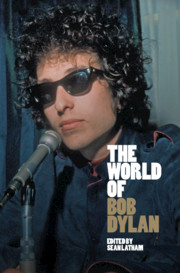Book contents
- The World of Bob Dylan
- The World of Bob Dylan
- Copyright page
- Contents
- Contributors
- Acknowledgments
- Introduction: Time to Say Goodbye Again
- Part I Creative Life
- Part II Musical Contexts
- Part III Cultural Contexts
- Part IV Political Contexts
- Part V Reception and Legacy
- Chapter 24 The Bob Dylan Brand
- Chapter 25 The Nobel Prize: The Dramaturgy of Consecration
- Chapter 26 Dylan: Stardom and Fandom
- Chapter 27 The Bob Dylan Archive®
- Further Reading
- Index
Chapter 25 - The Nobel Prize: The Dramaturgy of Consecration
from Part V - Reception and Legacy
Published online by Cambridge University Press: 21 April 2021
- The World of Bob Dylan
- The World of Bob Dylan
- Copyright page
- Contents
- Contributors
- Acknowledgments
- Introduction: Time to Say Goodbye Again
- Part I Creative Life
- Part II Musical Contexts
- Part III Cultural Contexts
- Part IV Political Contexts
- Part V Reception and Legacy
- Chapter 24 The Bob Dylan Brand
- Chapter 25 The Nobel Prize: The Dramaturgy of Consecration
- Chapter 26 Dylan: Stardom and Fandom
- Chapter 27 The Bob Dylan Archive®
- Further Reading
- Index
Summary
If you search the web for “Bob Dylan Nobel Prize,” Google returns three million items.1 That is not a huge result for a Google search, but it’s a hell of a lot for a literary award. Consider that the same month Dylan was announced as laureate, Britain’s Man Booker Prize was awarded to an American author for the first time ever. The Booker has generally been a more reliable publicity-generating machine than the Nobel, and Paul Beatty’s win for The Sellout was a major milestone in its history, marking a recalibration of the transatlantic literary relationship that had been anxiously anticipated and hotly debated for years. But a search for “Paul Beatty Booker Prize” returns barely a tenth as many relevant pages as the Dylan Nobel search. We shouldn’t infer too much from these crude search counts, but this much seems clear: Dylan’s consecration by the Swedish Academy and Nobel Foundation as one of the world’s greatest literary artists was sufficiently disruptive of established norms to generate an outsized volume of commentary. What I wish to argue here, however, is that this unsettling impact was superficial, and the episode was on the whole a positive one for the judges, the recipient, and the institution of the prize. The scandals of corruption and abuse that emerged soon after in Stockholm, paralyzing the Academy and forcing a reboot of the entire administrative operation, should not blind us to the fact that in 2016 the Nobel enjoyed a very good year.
- Type
- Chapter
- Information
- The World of Bob Dylan , pp. 299 - 312Publisher: Cambridge University PressPrint publication year: 2021



